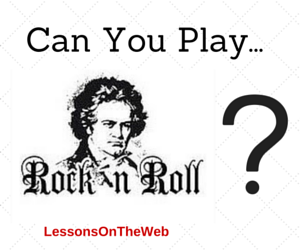|
It seems that the music world is sort of divided into those that play with music and those that don’t.
Typically, classical musicians read from notes at least 90% of the time, and non-classical players play from ear about 90% of the time. Is it possible to move from one to the other…as in, can a strictly classical player become a rock n’ roll 'jammer'? Absolutely! Here’s how. 1) Let go of the concept that you have to have notes in front of you to make music on your own. Now if you’re just starting to play, you are going to be better off if you learn the basics. Learn your notes, study some basic rhythm, and practice your scales and other exercises to get your fingers in shape and comfortable playing the notes. Next, play your scales without music...by memory. Do you remember any easy exercises that you can play by memory? What about Hanon? When you move into playing rock n’ roll or other types of music besides classical, you won’t have music in front of you most times. If you know your key signatures, basic time signatures, and your scales, you’ll have everything you need to get going. 2) Learn the Lingo There’s a different vocabulary in the rock n’ roll world…or any kind of improved music that doesn’t rely on notes to be played. When you start playing music by ear with others in a band or jazz ensemble, you’re likely to hear terms like this:
Although there are many more, these terms will get you going and help you understand some of the new lingo that you’ll hear and use when you start playing by ear. 3) Brush up on your Improv Skills This might be one of the hardest things for classical musicians to adapt to…making up your music, instead of playing by notes. The subconscious security that “note-readers” develop to music is uncanny. The fact is that most non-classical music, except for maybe jazz, isn’t nearly as difficult as classical music is; so technical challenges are not the main issue for classical players. The challenge…is playing from within, instead of relying on what is “with-out”…meaning outside of us, i.e...the music. Almost every musician that has ever gone from reading notes to improving without music said they were terrified at first. They had the skills to play the music, but they were afraid of messing up, or just simply not knowing what to play. Over time, after trying and playing a lot with others, the neat thing is, is that they fell in love with playing by ear! The KEY is… overcome your fear and play anyway. If you need help with doing that, check out our blog: “Want to Improve Your Improv”? One of the best ways to improve any kind of playing skill is by listening to music, and listening to the kind of music you want to play. Have you ever listened to someone sing or play one of your favorite songs, and wondered if they had classical training? Sometimes you can tell, but most times you can’t. Here are a few famous rock n’ roll musicians that had classical beginnings. Elton John – Elton said that he transitioned from classical to pop music, because his fingers were too short to play classical music well. Billy Joel – Not only did Billy take piano lessons as a child, his father was a professional pianist and conductor. David Bryon – Pianist for Bon Jovi, he is known to warm up before shows playing Mozart. Freddy Mercury – Lead singer for the band “Queen”, he began taking piano lessons at age 7. Ray Charles – Not only classically trained and blind, Ray is known for starting a whole new genre of music; soul music. Are you ready to stretch your piano fingers and play a little rock n’ roll? Great news… I’m in the process of developing a rock n’ roll course that will be easy and fun…! So stay tuned to LessonsOnTheWeb to learn much more – and for updates about my new Rock n’ Roll Course! Leave a Reply. |
AuthorMost blogs written by Archives
June 2020
Categories
All
|


 RSS Feed
RSS Feed